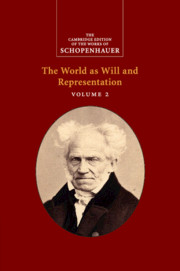Introduction
Published online by Cambridge University Press: 30 June 2022
Summary
Schopenhauer's The World as Will and Representation was first published in Leipzig at the end of 1818 (with 1819 as the date on its title page). It consisted of a single volume, which ranged through epistemology, metaphysics, philosophy of mind and action, aesthetics and philosophy of art, to ethics, the meaning of life and the philosophy of religion, in an attempt to account for nothing less than the world: the nature of our cognition or knowledge of reality and how it relates to reality itself, the nature of our existence and the existence of everything in the world, what is and is not of value in existence, the pain of the human condition and the possibility of deliverance from it. The World as Will and Representation is the major achievement of Schopenhauer's life, and the backbone of his intellectual career. In 1844 he published a revised and extended edition of it, and now added a whole second volume of ‘supplementary’ essays. It is this second volume, even longer than the first, that we have here in translation. In 1859, the year before he died, Schopenhauer revised both volumes for a final time, making many further additions. The text we have used for this translation is essentially this last edition, subject to certain further revisions by various editors, starting with Julius Frauenstädt in 1873, through Paul Deussen's edition of 1911, to Arthur Hübscher's of 1988, which we treat as the standard text. Our endnotes give detailed information about changes between the different editions of Schopenhauer's lifetime.
On first publication of volume 1 of the work, its 30-year-old author stated in the Preface that it aimed ‘to convey a single thought’. We are to assume that this also applies to the work in its entire two-volume manifestation with the supplementary essays. The nature of this single thought, however, has been the subject of some slightly perplexed debate. If there is a single thought, it must be highly elusive or highly complex, or both. But we can perhaps make an initial approach towards what Schopenhauer means if we examine the framework of four Books into which the original World as Will and Representation is divided.
- Type
- Chapter
- Information
- Schopenhauer: The World as Will and Representation , pp. xiii - xxxviPublisher: Cambridge University PressPrint publication year: 2018



